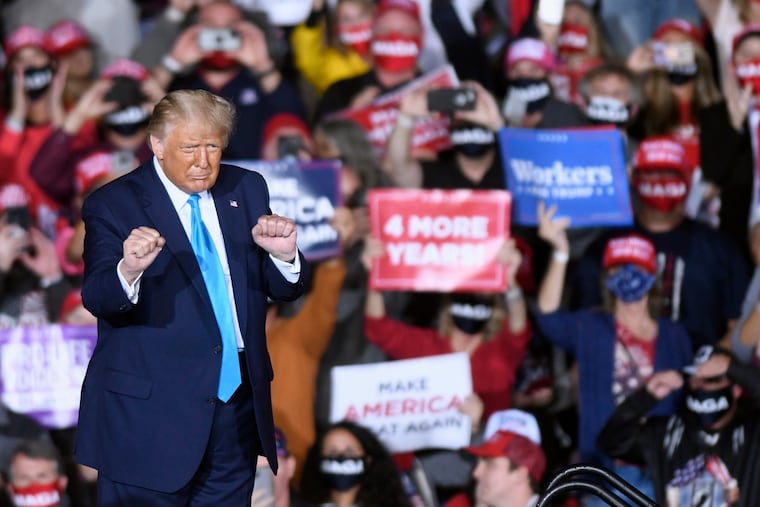Trump’s coronavirus diagnosis doesn’t change things for Republicans in Pennsylvania
“I guess he could die or something," one Trump supporter said of what it would take to separate him from the president. "I wouldn’t vote for him then.”

Republican voters in the critical battleground state of Pennsylvania largely shrugged off the news Friday that President Donald Trump had contracted the coronavirus, saying it did little to change their impressions of his leadership or his handling of the pandemic.
“I’m a Trump supporter and will vote for him. I don’t think there’s anything that could change that,” said Rhoderick Mahlon of Fulton County, a deeply Republican area in south-central Pennsylvania where Trump won 84% of the vote in 2016 — a higher percentage than any other county in the state
“I guess he could die or something," Mahlon added. "I wouldn’t vote for him then.”
Mahlon, 74, a retired Sears employee, said he’s concerned about the coronavirus because of his age and wears a face mask even though “I really don’t think they do much good.”
He said Trump has done his best to manage the pandemic, given what he called shifting advice from the medical community. “The medical people contradict what they said in the past,” Mahlon said. “I guess [Trump] has done what seems to be the best he can.”
Trump supporters downplayed the seriousness of his condition and its potential impact on the election, likening his diagnosis to the risk anyone faces when they leave their house during a global pandemic.
“This was totally random. Anybody could have gotten it. This time it was him,” said David Graham, a 66-year-old Johnstown Republican and a member of The Inquirer’s Election 2020 Roundtable of Pennsylvania voters.
» FAQ: Your coronavirus questions, answered.
Lauren Jessop, of Easton in Northampton County, said it’s not fair to blame Trump for getting sick. As president, he doesn’t have the option of “staying locked in his office all day,” she said.
“He needs to be out and about,” said Jessop, 62, a Republican and another Election Roundtable member, who voted for Trump in 2016 and plans to do so again. “He needs to be out among people.”
Jessop said she always wears a mask when she’s indoors and keeps a safe distance from others. And if she’s standing near someone outside who is wearing a mask, she pulls hers up as a courtesy.
» READ MORE: The election in Pa. is rocked by the uncertainty of a president stricken by coronavirus
Jonathan Taylor of Gettysburg said Trump has handled the coronavirus well. The only thing that would change his mind on that, Taylor said, is if the president acted with “total disregard” for safety precautions. (Trump often eschews mask-wearing and routinely holds large political rallies in defiance of public health guidelines.)
Taylor, 62, went to his first Trump rally in 2016 and wouldn’t hesitate to go again.
“The chance of it being transmitted airborne is small,” said Taylor, another Roundtable member. “I’d have no problem being in a rally with a big group of people.”
» READ MORE: Organ-by-organ, see how the coronavirus can attack the body
One Republican who opposes Trump said his illness is the direct result of his disdain for masks.
“He’s a victim of his own mishandling, and now he’s paying the price,” said James Hill, 71, of Philadelphia. “I don’t mean that in a malicious way. I do hope Trump and his wife recover.”
Scott Young, 51, called news of the president’s diagnosis “jarring.” He was already wearing a mask in public and avoiding crowds, but said he will be even more vigilant about safety precautions going forward.
“I believe he’s done a poor job all along," said Young, who lives in Newtown, Bucks County. "The diagnosis, unfortunately, hammers home that point. If he was unwilling to take basic precautions, including mask wearing and distancing, and he contracts the virus, how can we trust him to make policy decisions that will require others to follow the rules?”